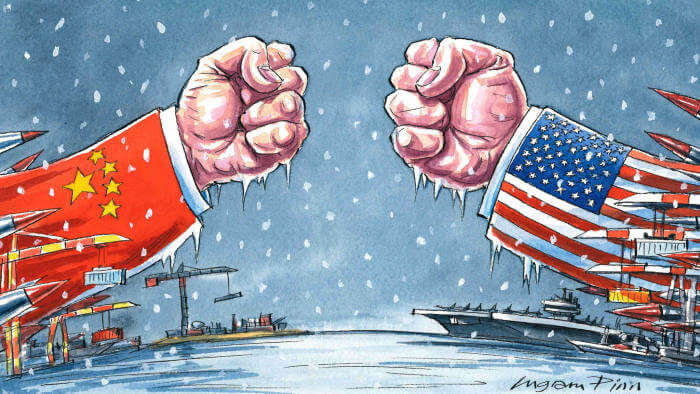Cracks in the US-China relations continue to deepen, with China rejecting American attempts of creating a “new Cold War”. In an interview with Xinhua, Chinese State Councilor and Foreign Minister Wang Yi stated, “some American politicians who are biased against and hostile to China are using their power to smear China with fabrications and impede normal ties with China under various pretexts.” Yi further explained that such attempts would harm the interests of both nations and stressed that “anyone who tries to start a so-called “new Cold War” in the 21st century will be on the wrong side of history”.
The ongoing trade war between the US and China is negatively impacting other nation-states such as India, Japan, and South Korea, among others. Only in January this year was a trade truce signed wherein China agreed to purchase $200 billion of goods and services from the US, compared to the 2017 baseline for the next two years.
We hope that the U.S. will respect China's social system and the Chinese people's choice, and give up its failed interventionism, says Chinese State Councilor and Foreign Minister Wang Yi in an exclusive interview with Xinhua pic.twitter.com/eUxZjvqGpM
— China Xinhua News (@XHNews) August 5, 2020
Relations have continued to fray in light of the Covid-19 epidemic, with both sides indulging in rhetoric. For instance, President Trump’s insistence on terming the virus as Chinese and Foreign Secretary Pompeo’s speech in July accusing China and the Communist Party of tyranny depict the fissiparous nature of ties between Beijing and Washington. In response, China, too, has engaged in rhetorical overtures to Pompeo’s speech, with Chinese Foreign Ministry spokesman Hua Chunying saying it was Pompeo’s “attempt to cast himself as the 21st-century version of American diplomat John Foster Dulles”.
Apart from trade and rhetoric, US-China tensions have spilt into the domain of technology and strategic affairs. The Trump administration’s possible steps to ban TikTok, owned by Chinese firm ByteDance, and force its sale to Microsoft indicate the growing mistrust between China and the US. In response, China has called the move to sell TikTok as “daylight robbery” and protested the deadline of 45 days to reach a deal. Furthermore, the US has also announced its plan of launch the “Clean Network Program”, which aims to reduce Chinese access to American data. Pompeo claimed momentum for the Clean Program is growing with “more than thirty countries and territories” being “Clean Countries”.
Away from the world of technology, in the South China Sea, China and the US participated in naval exercises. However, the decision by the Philippines to not hold naval exercises in the area was welcomed by Beijing with Foreign Ministry spokesperson Wang Wenbin stating that “China hails the Philippines for rebuffing attempts of some countries to incite tensions in the South China Sea”.
The real challenge to the current international order and system is that the United States has gone extreme to pursue unilateralism and bullying, says Chinese State Councilor and Foreign Minister Wang Yi in an exclusive interview with Xinhua pic.twitter.com/0LnTZT7HTH
— China Xinhua News (@XHNews) August 5, 2020
Although the downward trend in relations continues, China, for its part, has called for cooperation with the US. Chinese Foreign Minister, Wang Yi stated, “China and the United States should stop attempts at decoupling and advance the relationship through cooperation, and live up to their responsibility for the world.” He added that “starting a diplomatic war does not prove the strength of the United States, but exposes its increasing lack of confidence”.
Impending talks between China and the US on trade are scheduled to take place around August 15. Given the deteriorating relations between Beijing and Washington, these discussions stand to be a pertinent marker to assess the future of the US-China stand-off.

